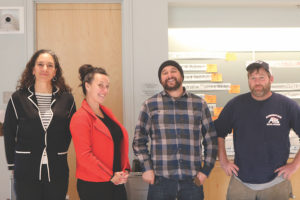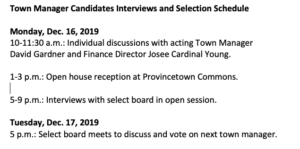EASTHAM — Four of the youngest members of our local select boards, all elected for the first time in the last two years, met for a conversation about the future of the Outer Cape last Thursday at the Eastham library. The audience for the event, organized by the Independent, was small, but the topics that were addressed were large: finding answers to the lack of housing for year-round residents and young families; preserving village life under pressure to turn the Outer Cape into a summer resort; building infrastructure, like broadband and better cell phone service, that would enable start-up businesses to create jobs; organizing a coordinated regional strategy to adapt to the climate crisis.

A key to progress, the group agreed, is getting more people involved in local government to help create solutions to these and other complex problems.
Al Cestaro of Eastham, a fisherman and aquaculturist who is 39, said he is passionate about getting the right people onto local boards and setting up systems for their professional development. He was voted onto the select board in a special election in December 2018 and re-elected this year. He and one other member are under 40 years old.
“We have such a shortage of community input and volunteering,” said Cestaro. But “you’re only as fast as your slowest person,” he added, calling for more experienced people to offer their skills.
Cestaro also called for a restoration of civics education to get more people to understand the importance of local government. “The young people think ‘civics’ is a car,” he said.
Lise King, 55, elected to the Provincetown Select Board in 2018 and second youngest in that group, agreed with Cestaro.
“We have to go back to the basics,” King said, “and create civics education for the entire spectrum of age groups.”
Mike DeVasto, who at 38 is the youngest on Wellfleet’s board and spent several years living in Montgomery, Vt., said, “In Vermont, town meeting day is a state holiday. Everyone comes and they do it all day. Then they have a big party.”
Kristen Reed of Truro is the second youngest, at 35, of all current Outer Cape select board members. (Selectman Jared Collins of Eastham is 31.) She talked about how hard it is as a young person to make a life here.
“I’m a military and academic brat,” said Reed. “Cape Cod was the first place I ever felt at home. But when I wanted to plant roots here, I started to experience the challenges. I was loving it, but I had such a difficult time trying to find a place to live, I was forced to live off-Cape. Working in the gig economy is lucrative, but you’re not really building anything.”
“Housing is my primary concern,” said DeVasto. “It’s tied to economic development, a situation where people who want to stay here have some opening to do so.”
DeVasto, who is 27 years younger than the average of the ages of the other four Wellfleet select board members, sees a generational divide in how citizens view the housing crisis.
“Most residents don’t really understand the difficulty of putting a roof over your head in our housing market,” he said. “You can’t move anywhere if you lose your rental. I don’t think that’s grasped by most of the population. It’s our primary problem on the Outer Cape.”
DeVasto returned to Wellfleet from Vermont to take over his uncle’s aquaculture grant. Long-serving Selectman Jerry Houk was retiring and asked DeVasto to run for his seat this year.
“I said I didn’t want to,” said DeVasto, “and he said, ‘Think about it.’ I thought about it, and I did run and got elected, and I’m glad I did. Housing is a super challenging issue. There’s no one solution. We need drastic measures if we want to keep our villages villages and not become a resort community without a younger generation.”
He said he favored moving away from a focus on “affordable” housing, as in Wellfleet’s zoning rules for affordable accessory dwellings units. “The town has to start thinking about where we want to spend our short-term rental tax money,” he added. “That’s the primary driver of the housing problem: short-term rentals.”
King linked the housing situation to larger environmental issues in describing a “constellation of stresses” affecting young people. A videographer and former newspaper publisher, she produced the film “Heroin: Cape Cod, USA” for HBO.
“Why is this happening?” King asked. “Why are so many people struggling with addiction? Young people are looking around at the environment and the future and saying there’s not much out there for me. That level of stress is the primary driver of the opioid crisis.”
King argued for a concerted regional effort to address climate change. “Our economy is totally dependent on our natural environment,” she said. “The challenges are huge. We’ve had some response at the municipal level, but we haven’t a unifying mechanism to bring everybody together. Not all the communities are talking to each other. And I was surprised in the budget hearings in Provincetown that the department heads weren’t talking about how their budgets would be affected by climate change. How do we mandate that every piece of business has the lens of natural resources protection and climate change response?”
Reed argued that people who are feeling extreme economic stress can’t think about other problems.
“You need a job to pay your rent or mortgage so you can have the time to be mindful about what’s coming,” she said. “If you’re in pure survival mode, you have nothing else to give.”
A partner in Chequessett Chocolate, Reed said that business had been made possible by the internet.
“Broadband is one of the ways to have year-round jobs without having too much construction and development here,” she said. “But a lot of people don’t have access. We have terrible internet and cell phone service, especially in Truro.” She noted that some towns have created their own municipal internet companies.
Cestaro said he was “very invested in my neighbors’ success whether I agree with them or not.” He grew up in Eastham, then spent 14 years in the U.S. Army, serving in Afghanistan.
“I learned a lot of techniques in the tribal regions of Afghanistan,” he said. “Certain tenets of village living here are tribal. The foundation is the same, whether in Afghanistan or Cape Cod: Don’t be an asshole.”
Cestaro predicted that commercial fishing and shellfishing would grow into more important sectors of the local economy.
“We’re using science now to come up with the best possible scenario for the resource,” he said. “Fishing families were regulated right out of business because of bad science and big business. Now we’re coming back into a balance, with the community being a good shepherd of the resource. When I was a kid growing up here fishing 20 years ago, this conversation wasn’t happening. Now we’re talking about these things.”

